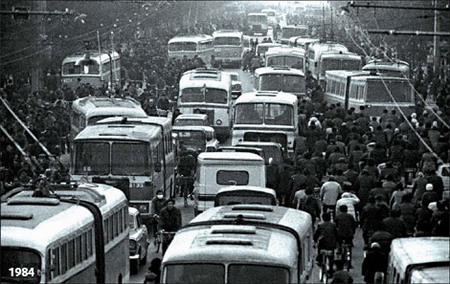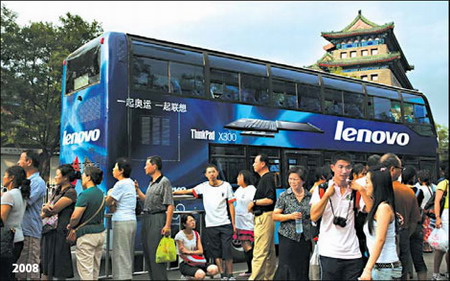
|
BIZCHINA> Wen's Lens
 |
|
Related
Road to modernity
By You Nuo (China Daily)
Updated: 2008-09-01 10:06
   Though the municipal authorities of Beijing said that they would not lower their environmental standards after the Olympics, they may have forgotten to mention the traffic. But they shouldn't. In fact, since late July, the Chinese capital has probably been enjoying its best traffic conditions in more than three decades - although one can argue that back in the 1970s, the city was not nearly as large as it is today. Longtime residents tend to romantically recall those years as a bicycle era. But the problem of development, or a lack of it, was already obvious, as can be seen from our photographer Wang Wenlan's 1984 shot of the crossroads at Chongwen Men, one of the major intersections in the traditional inner city (the old streets and houses built around the Forbidden City). You don't see any cars. It was a time when the general living standard was still very low, and most people could only afford similar dark baggy clothes in winter. But despite the lack of cars, the street was messy enough - as buses and the electrical trolley buses mingled with bicycles and pedestrians. And the air was darkened by emissions from all the old engines. What a joke at the time if someone had said this city would be hosting the Olympics one day. In contrast, a recent scene of Qianmen, which used to be where Beijing's front gate was , is more orderly and, in a way, more relaxing. Including the advertisement on the bus, which our photographer and I disliked because it is too obvious and we had no way to avoid showing it, it reflects many changes that have taken place in less than three decades - in people's clothing, in the mix of tourists and residents, in the improved vehicles, and in the well-restored old building that can be seen in the corner against the afternoon sky. Beijing's makeover of roads and public transportation helped it earn the chance to host the Olympics. Without that effort, life in Beijing would not be as efficient and clean as it is today. But as the municipal officials should not forget, this was also achieved only through a partial ban on private cars - after their number rose to around three million. To make itself a more welcoming city in the future, Beijing also cannot afford to scrimp on its investment in new roads and public transportation systems. Instead, it should speed it up.
(For more biz stories, please visit Industries)
|